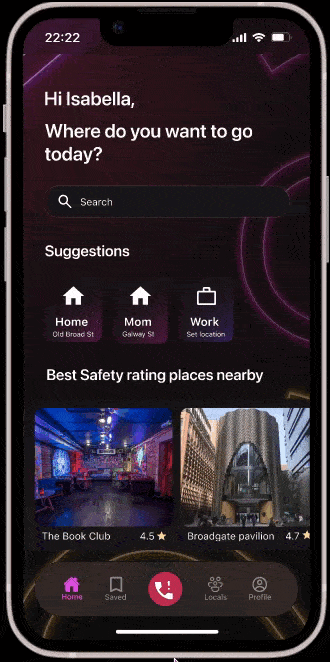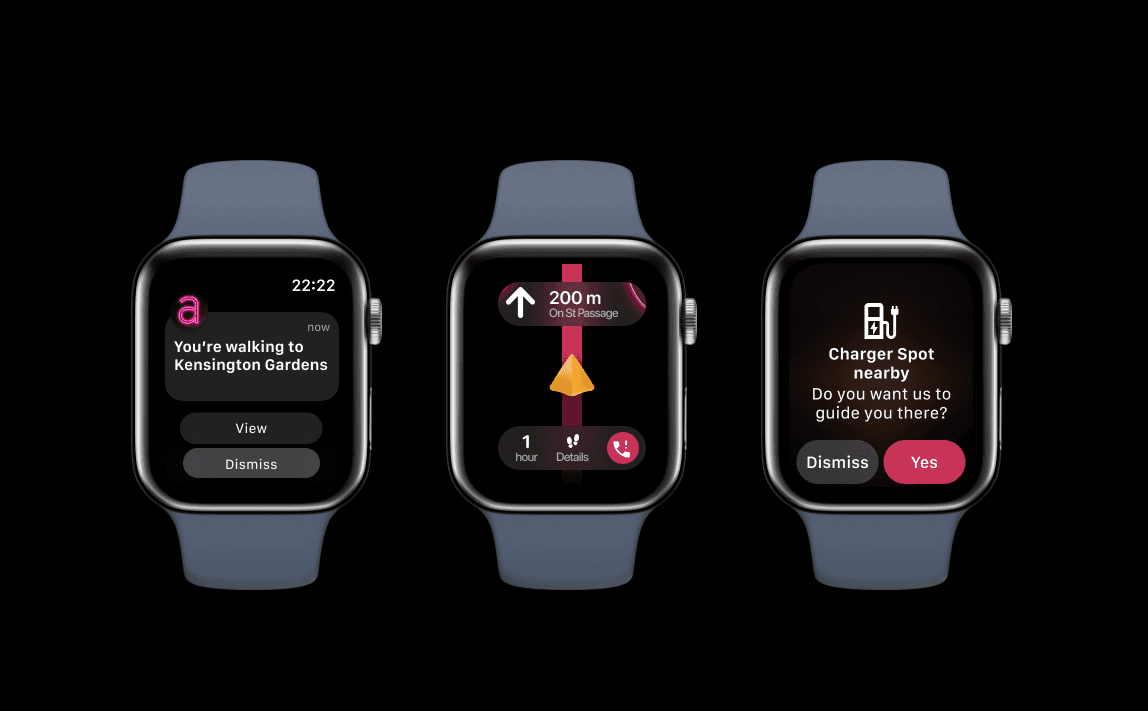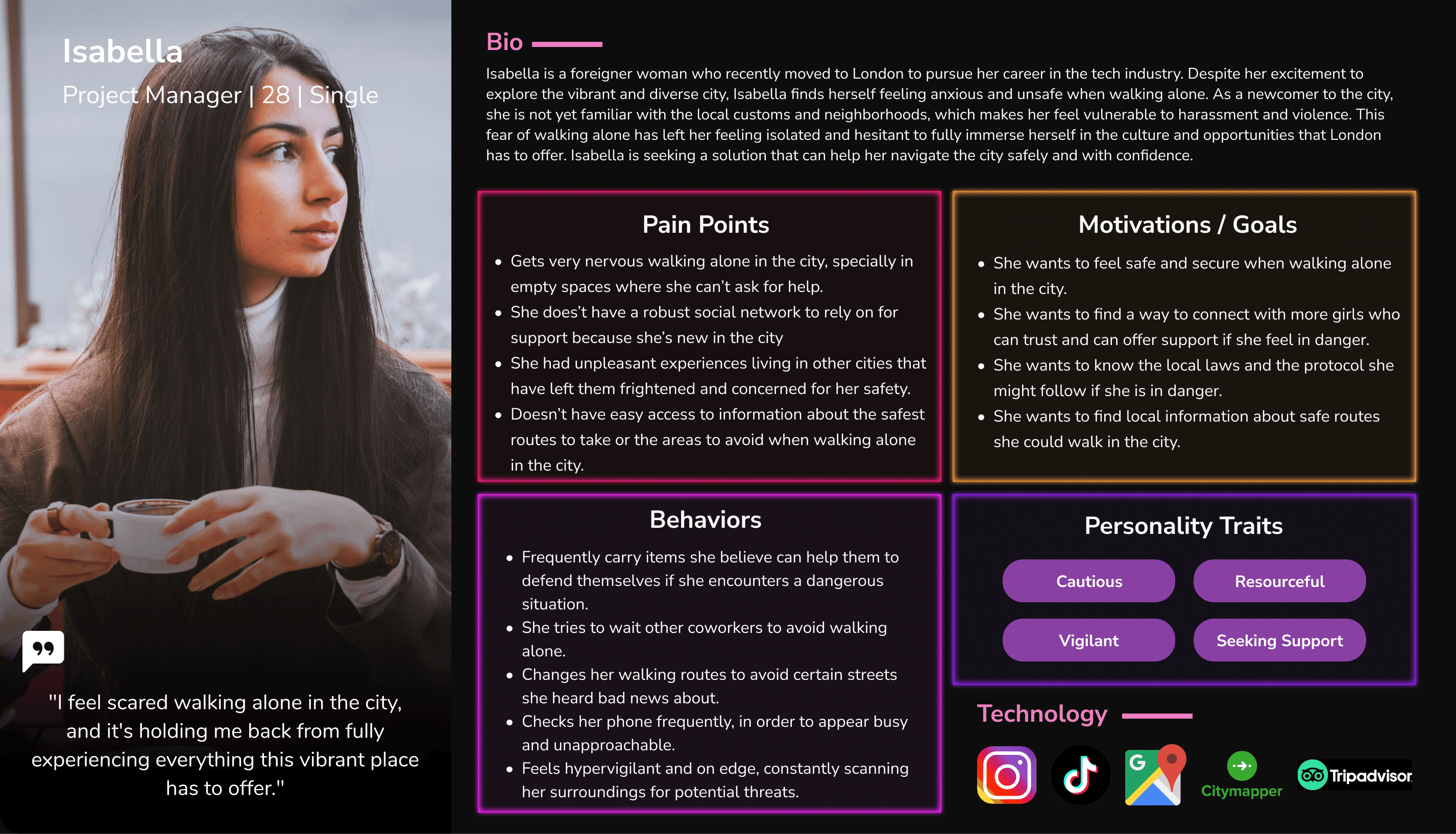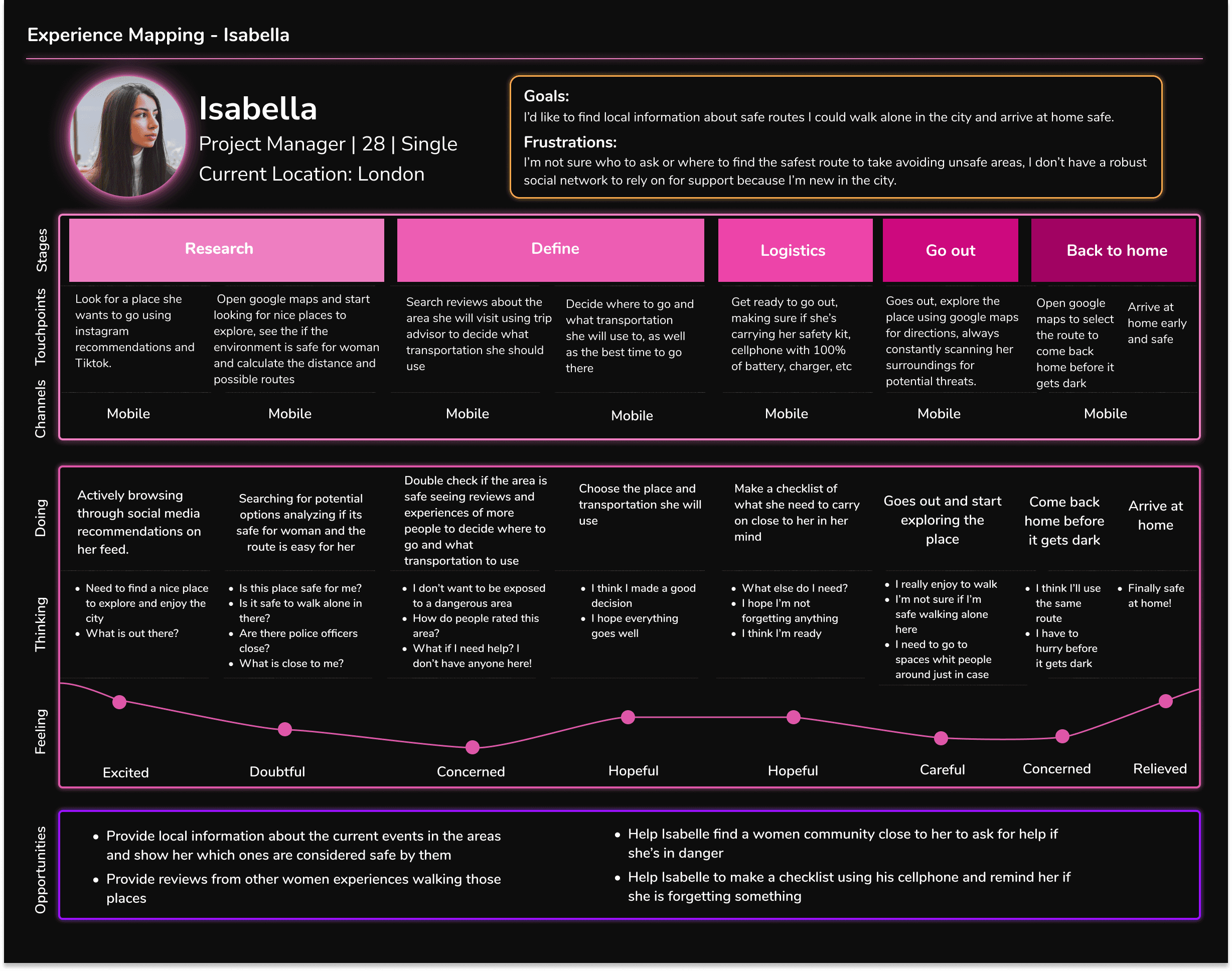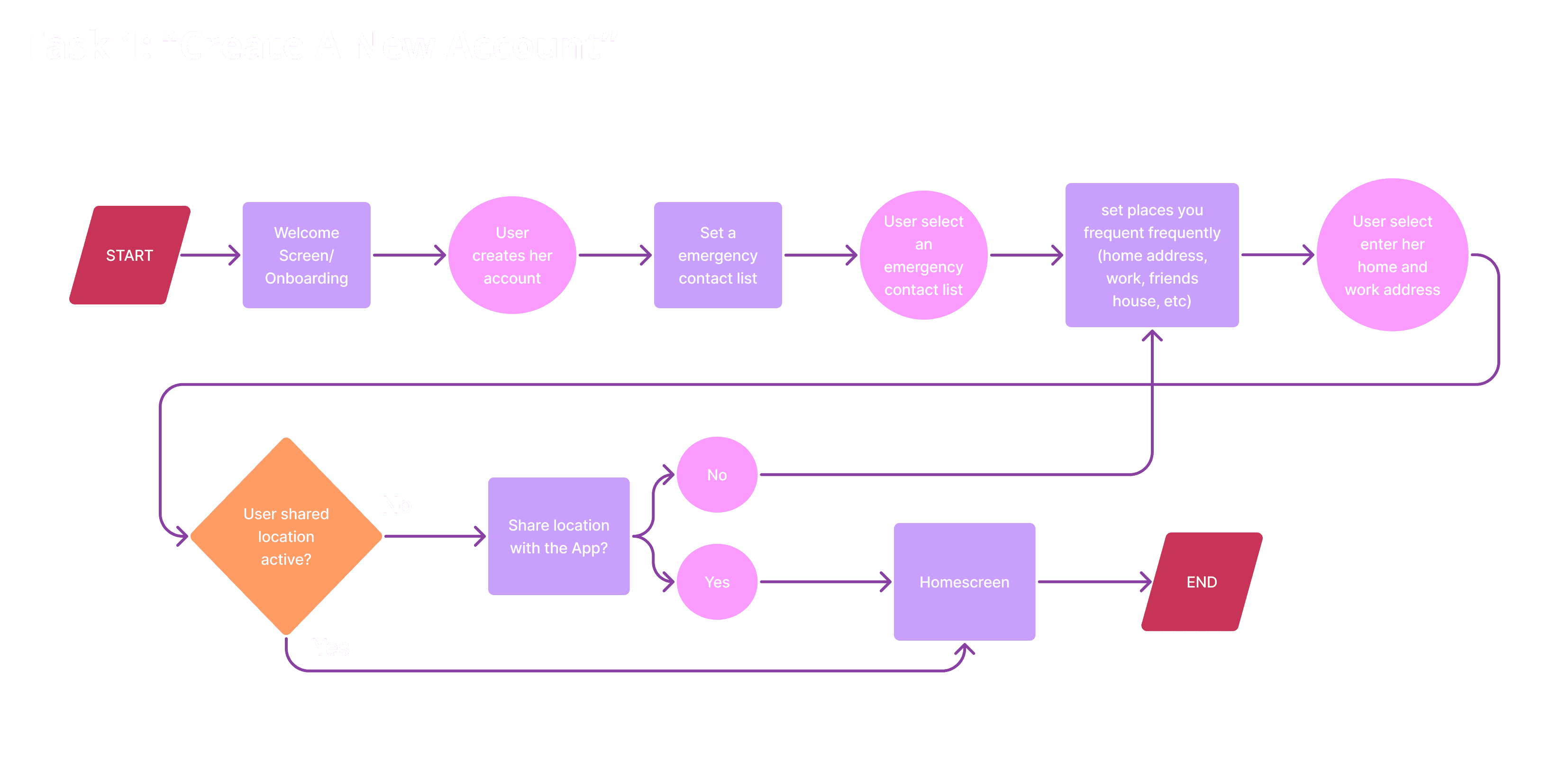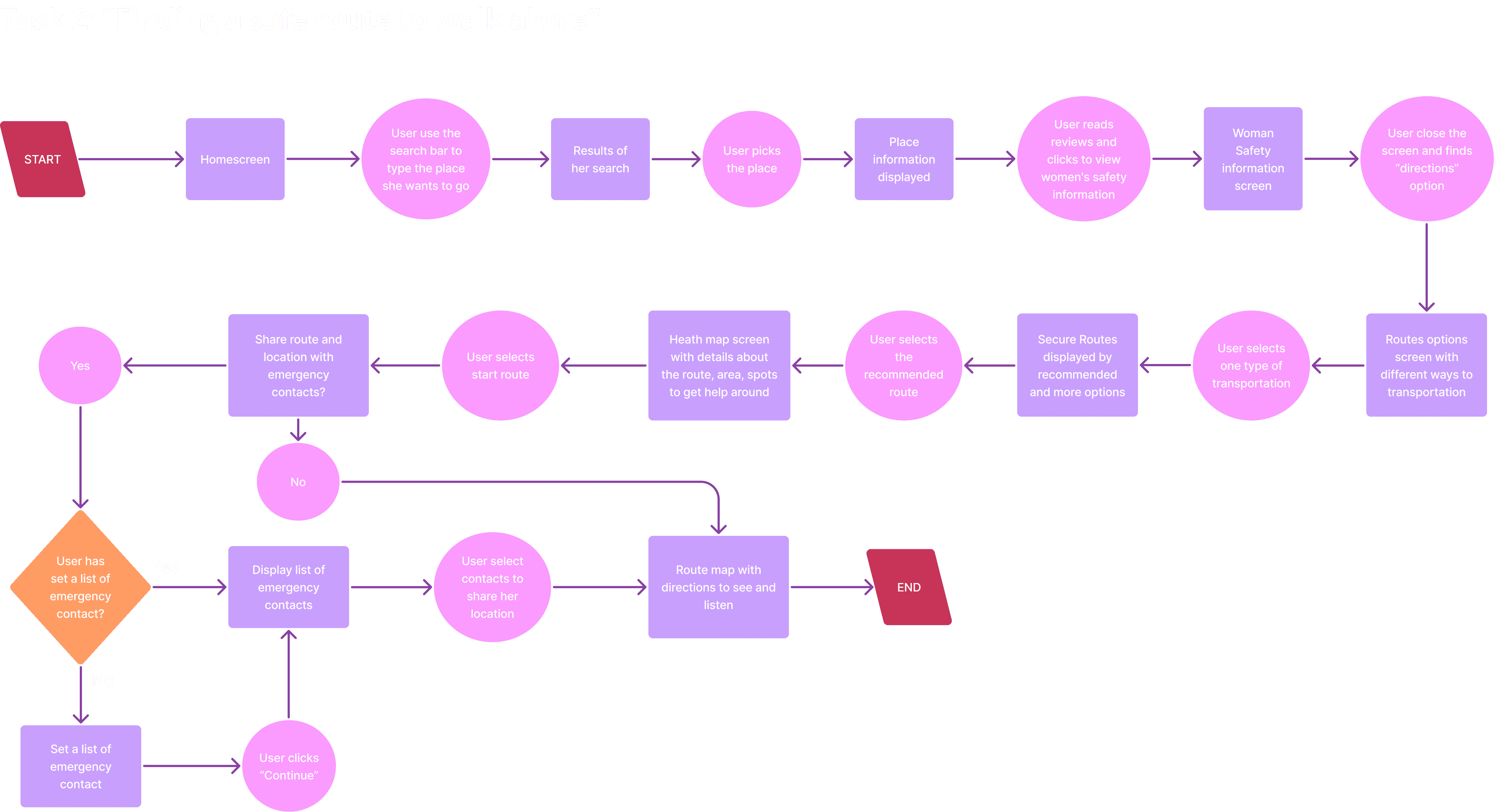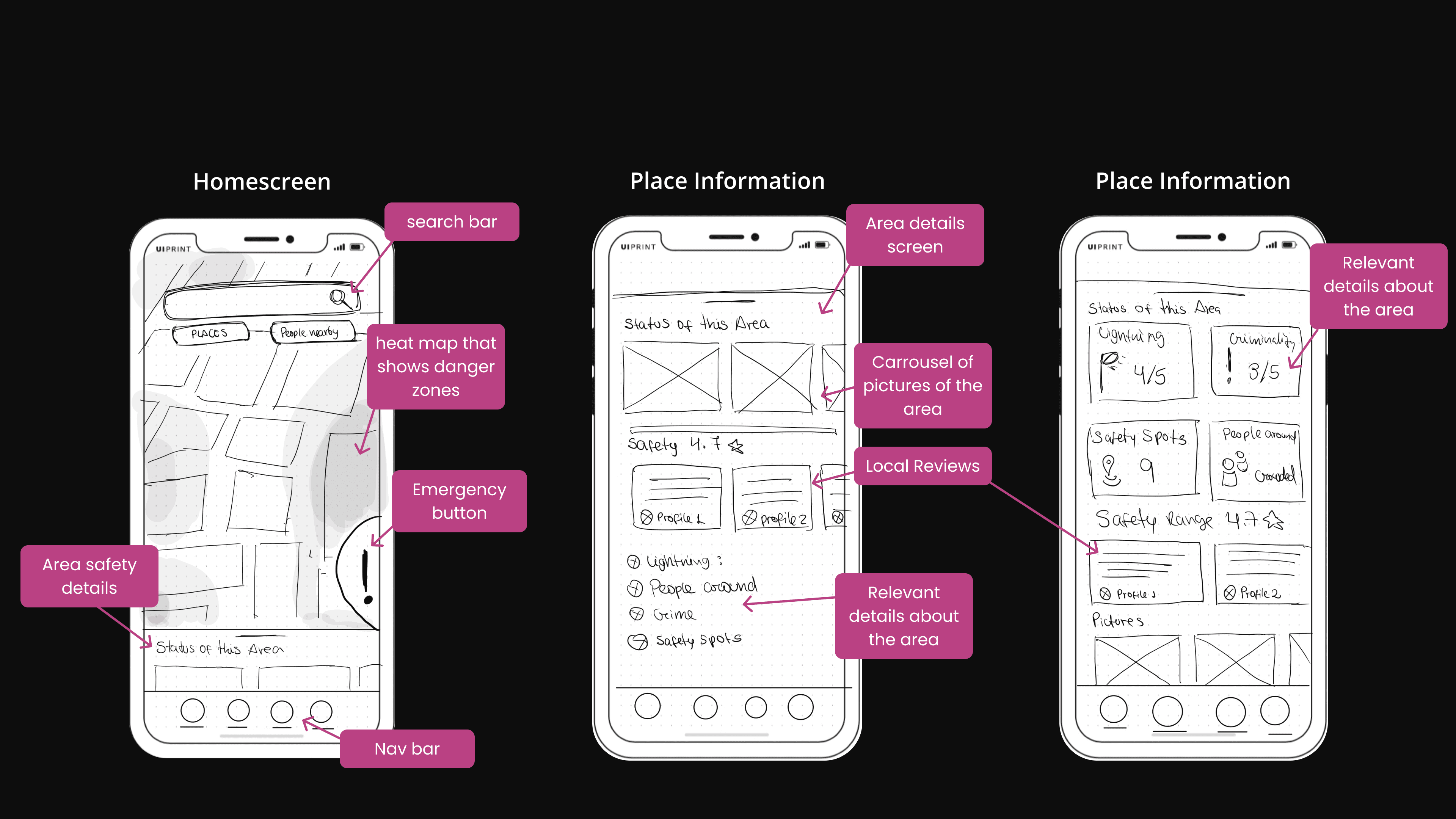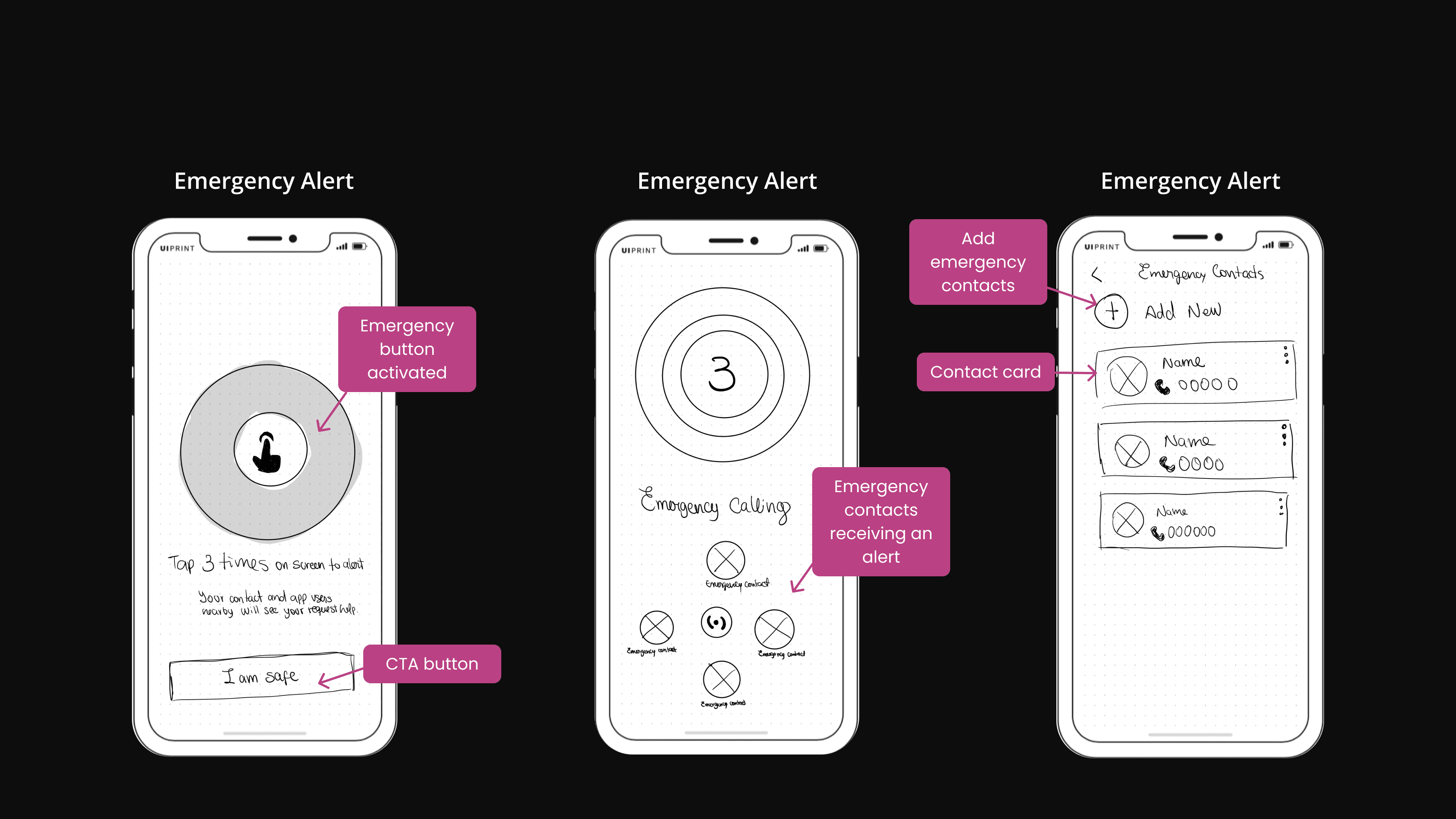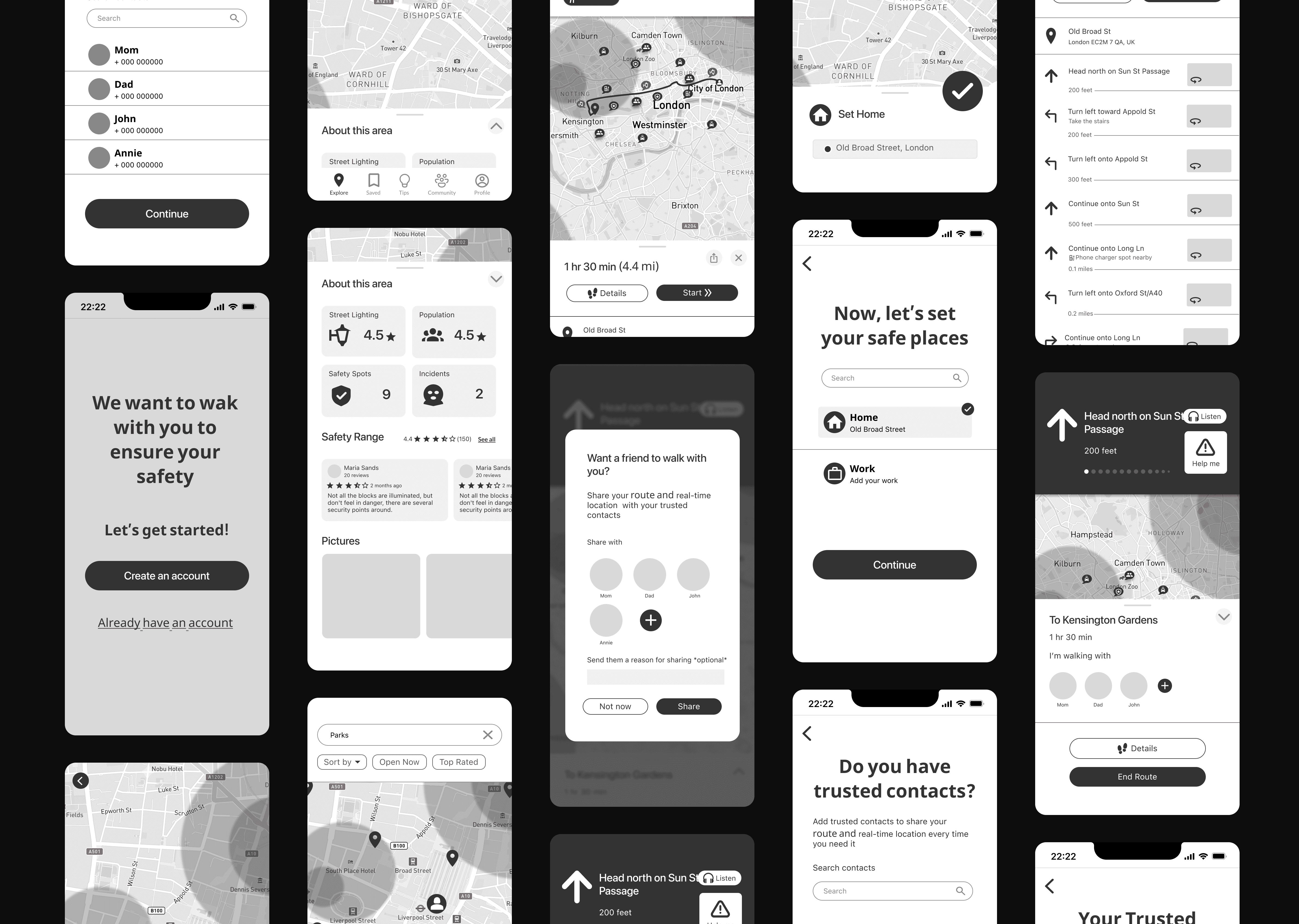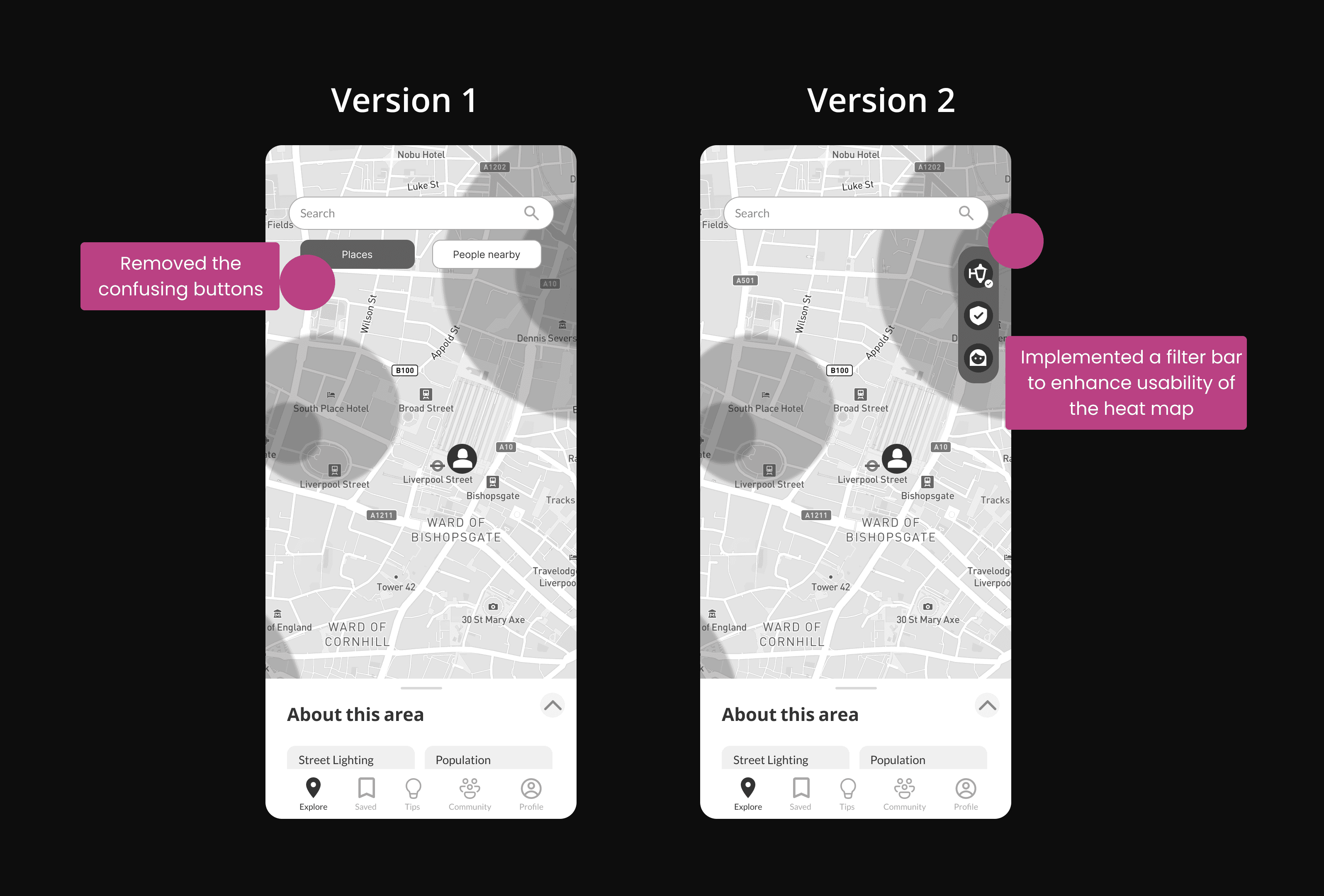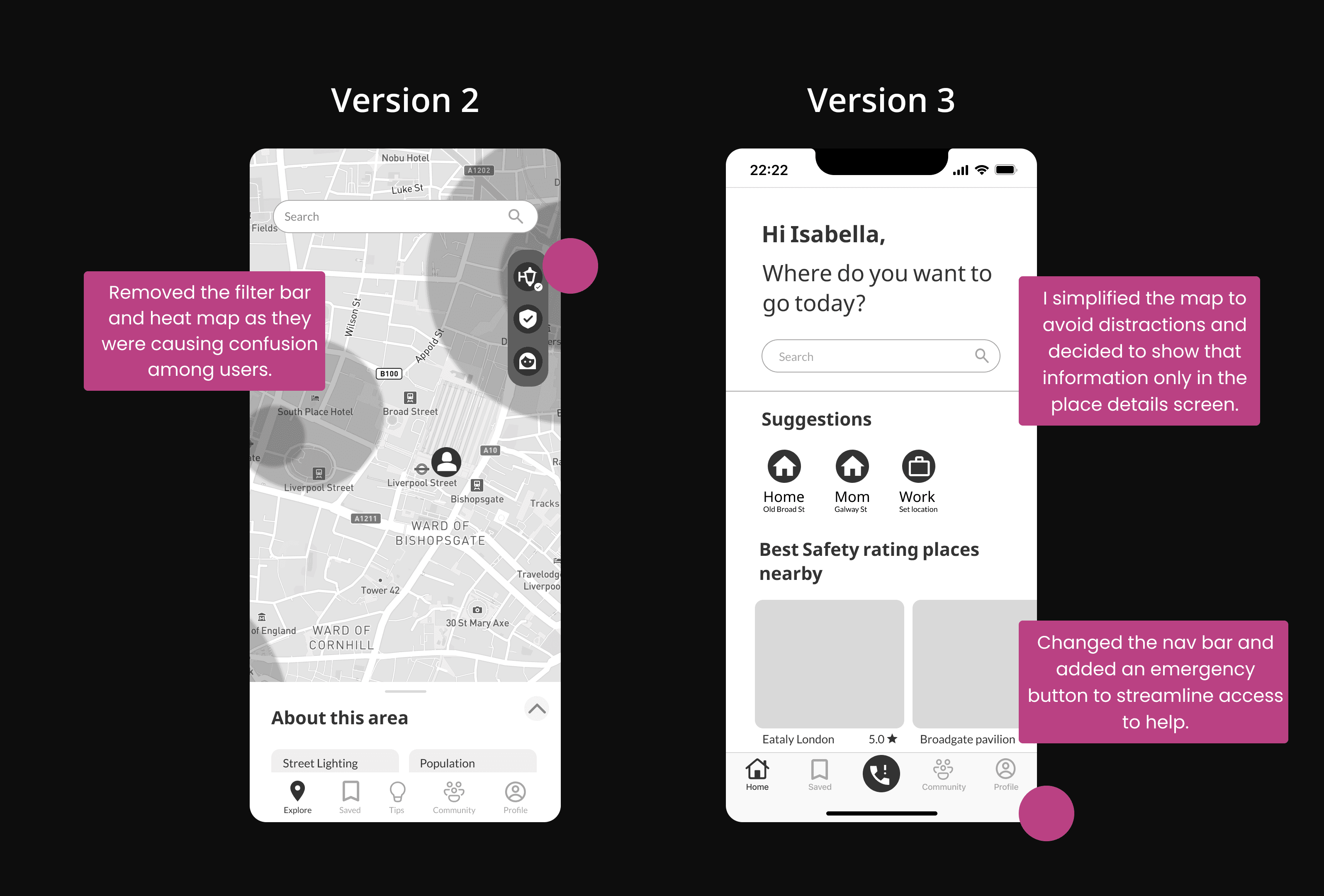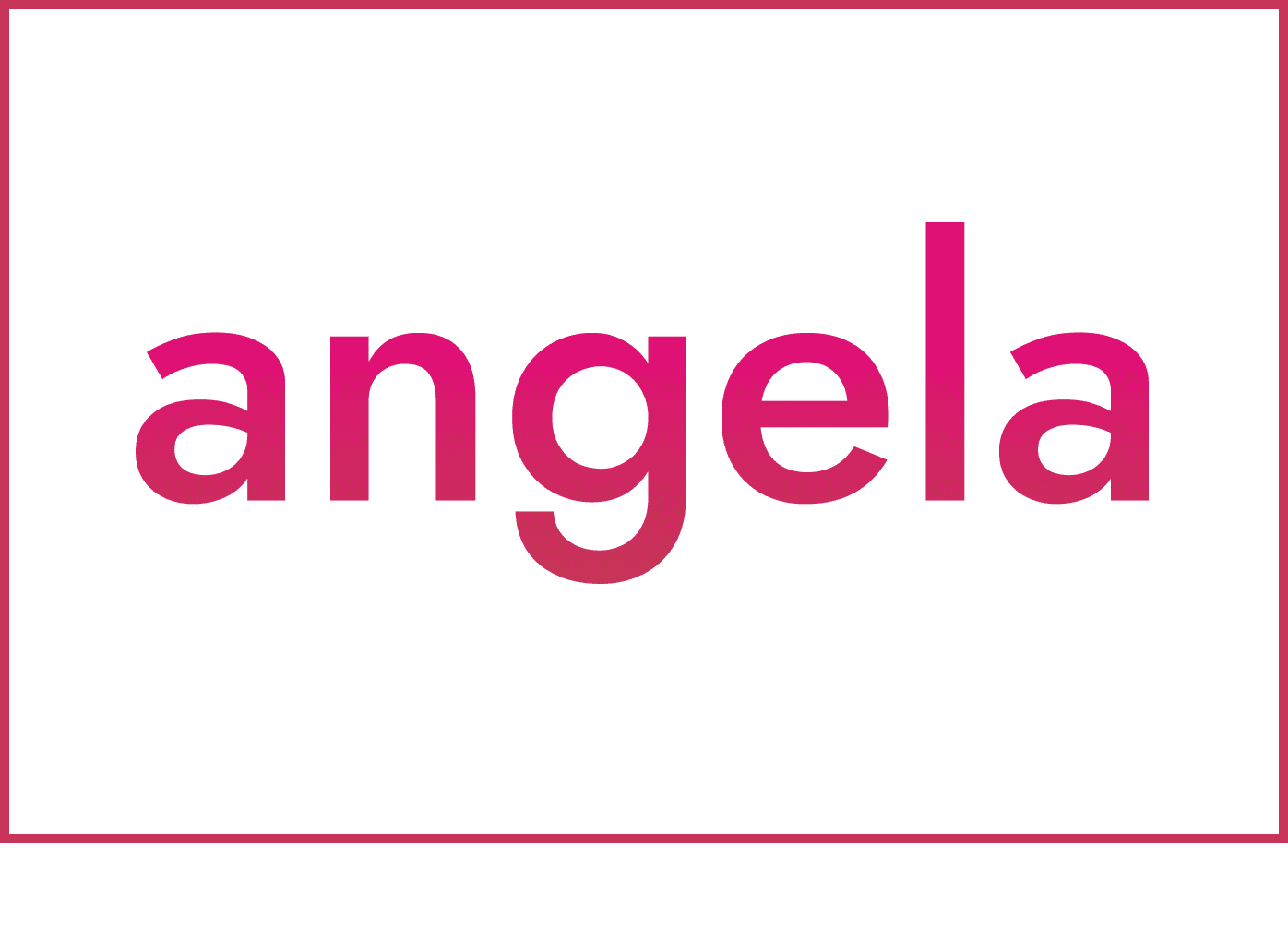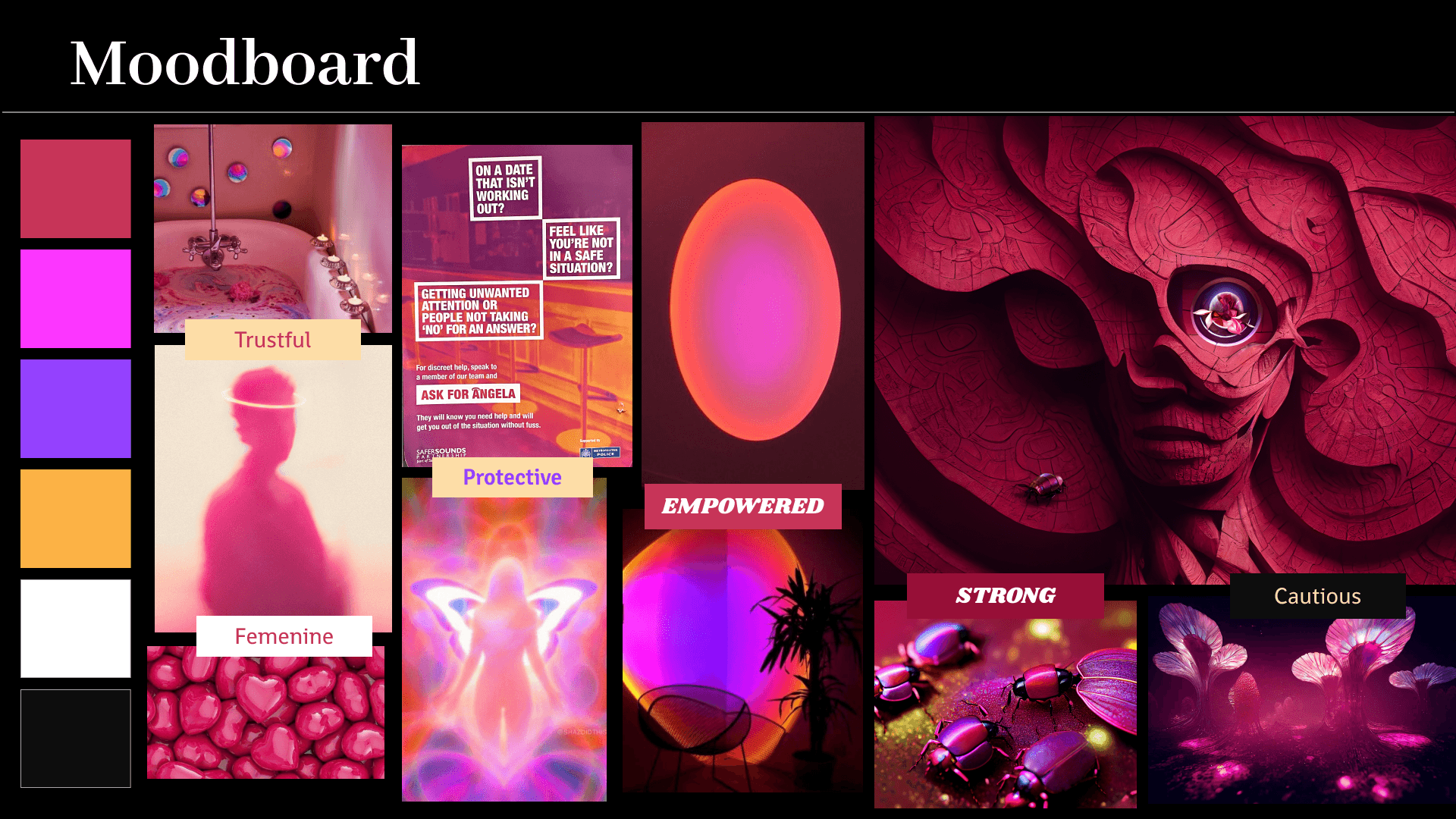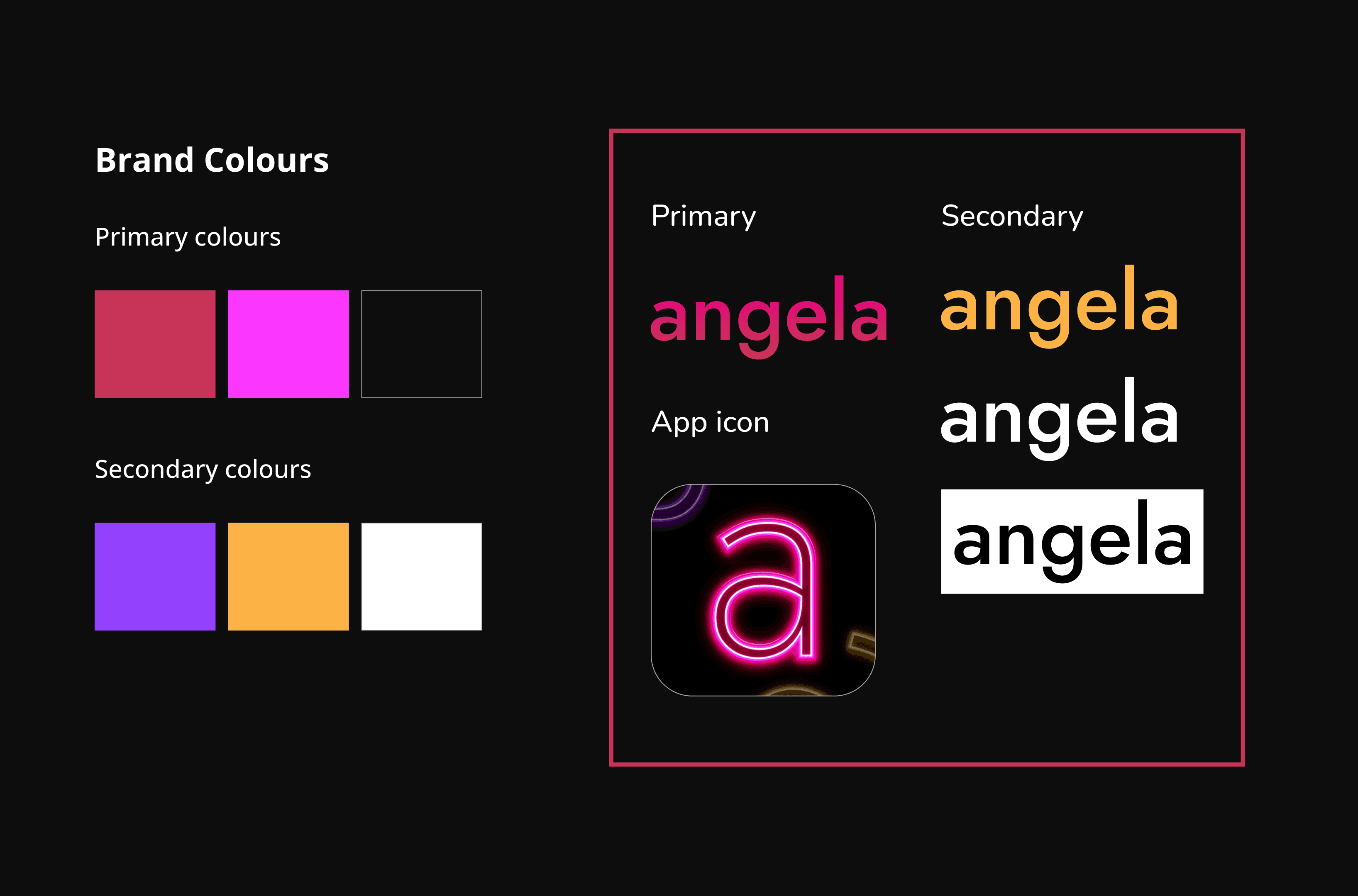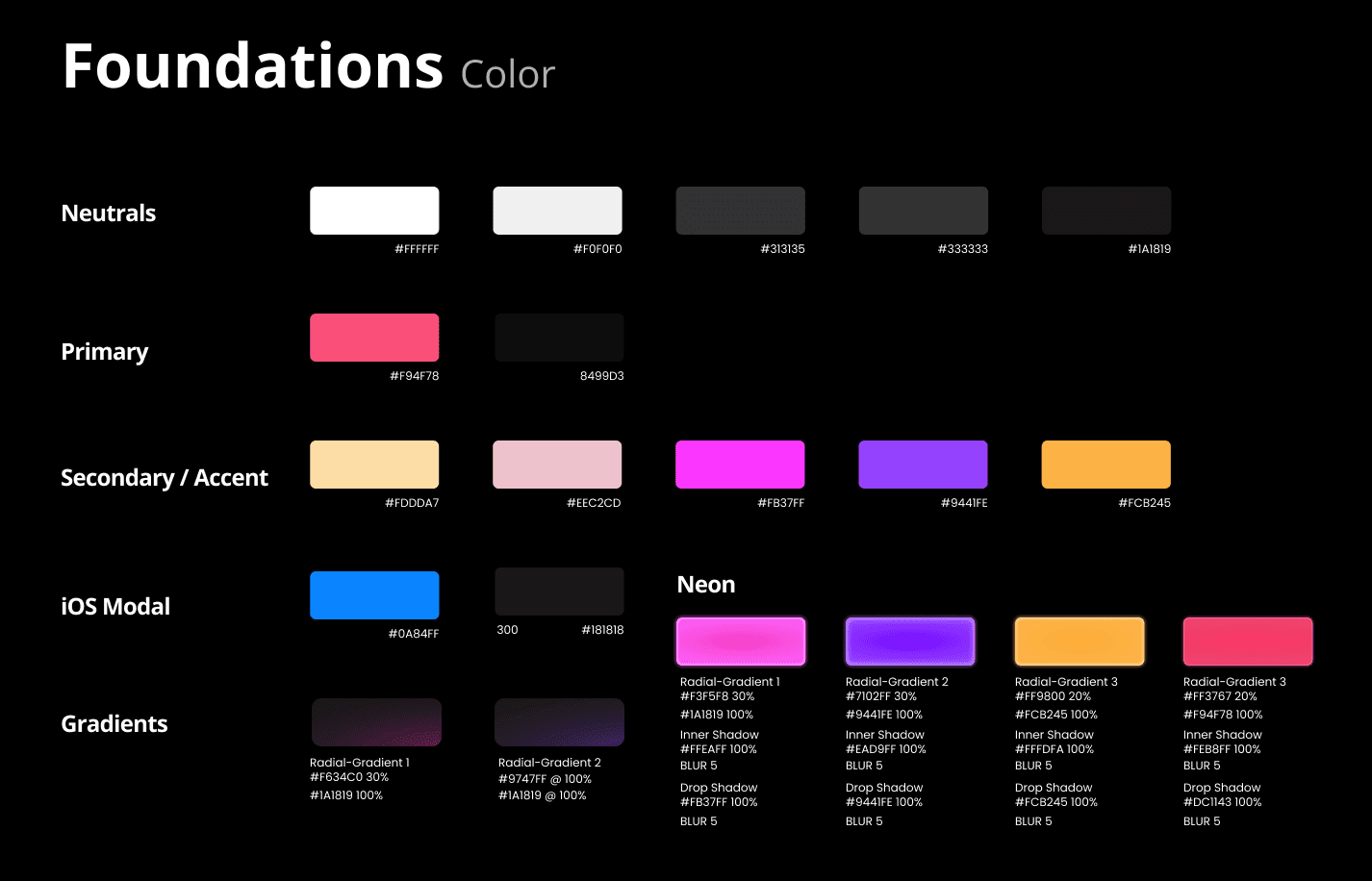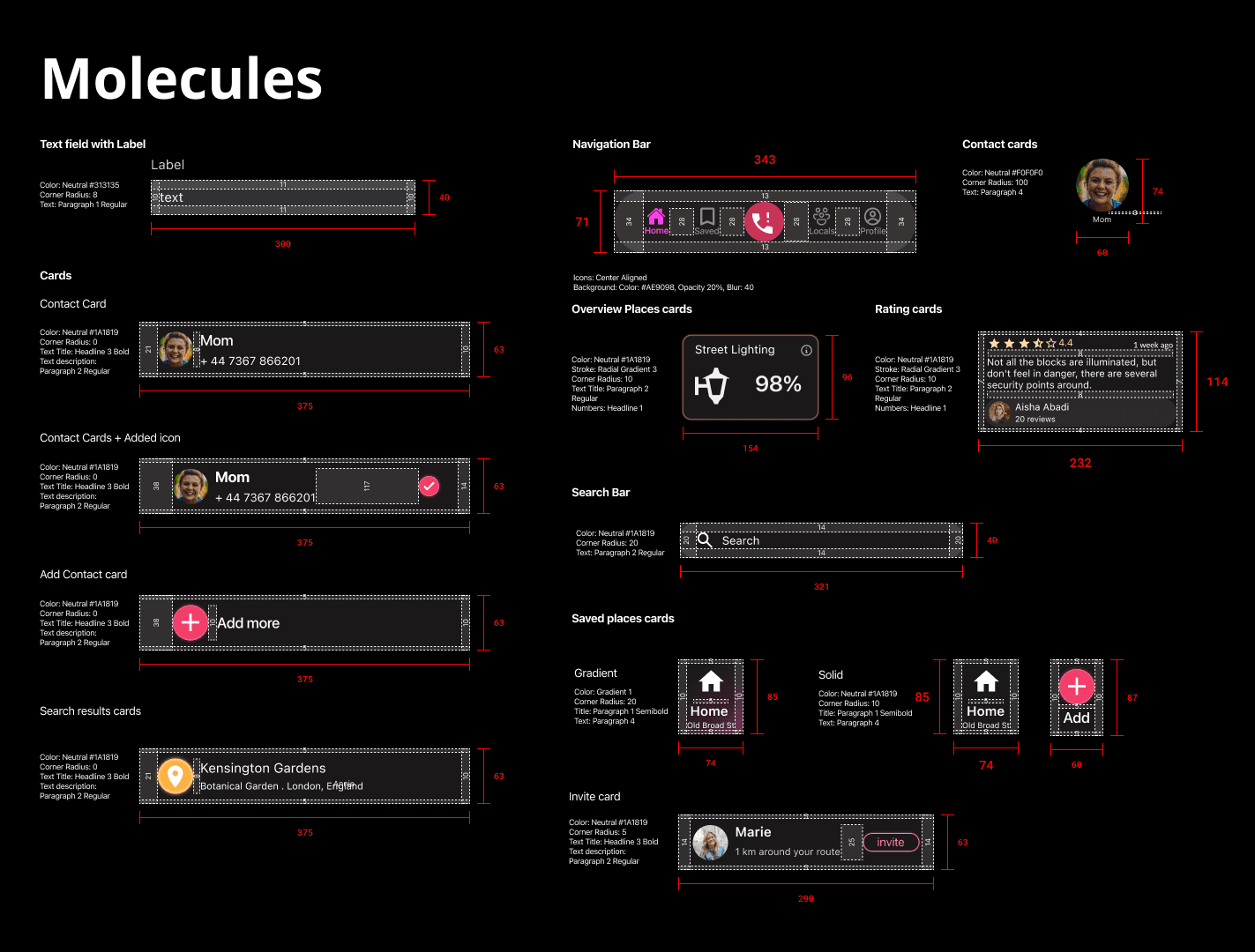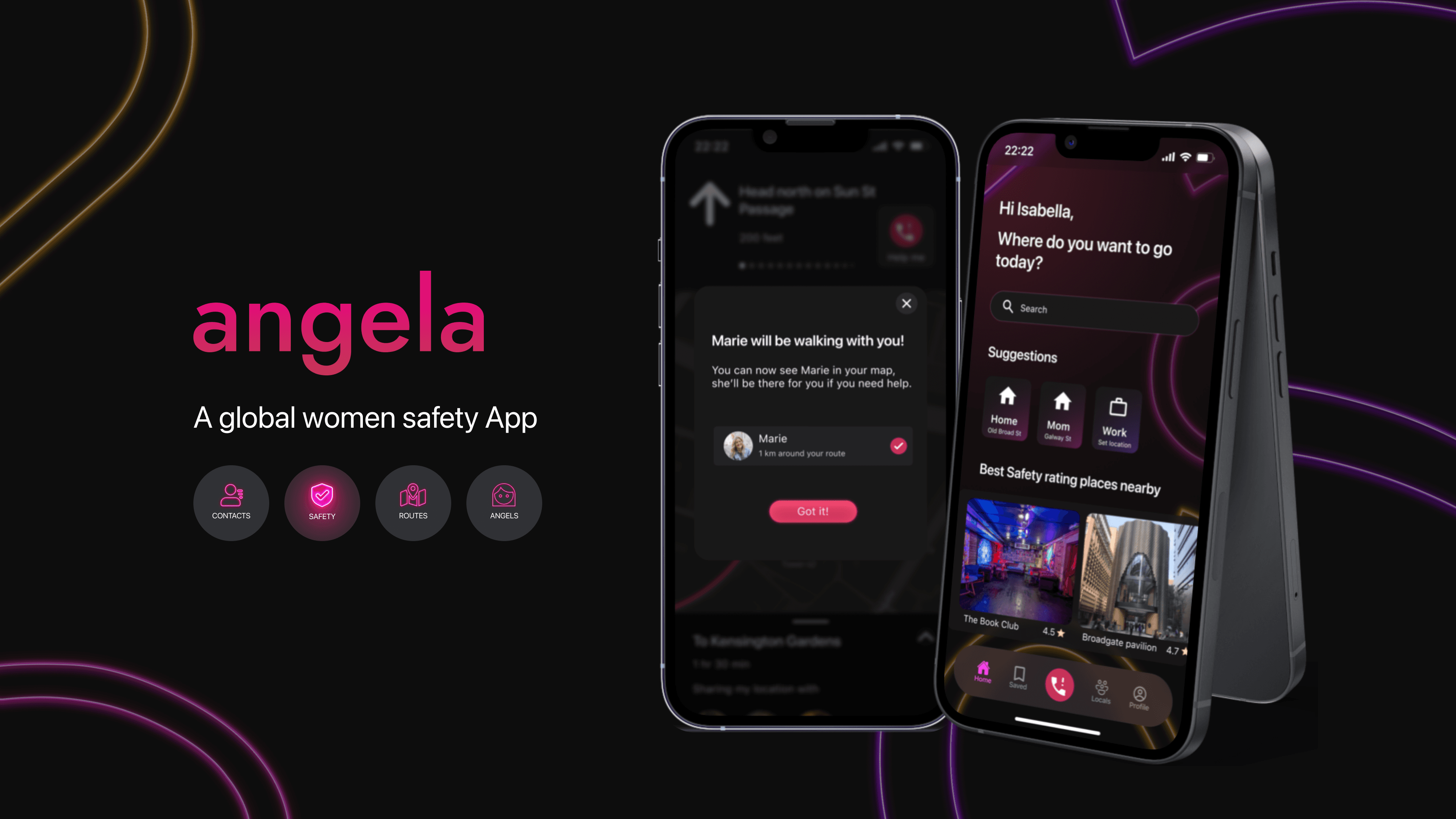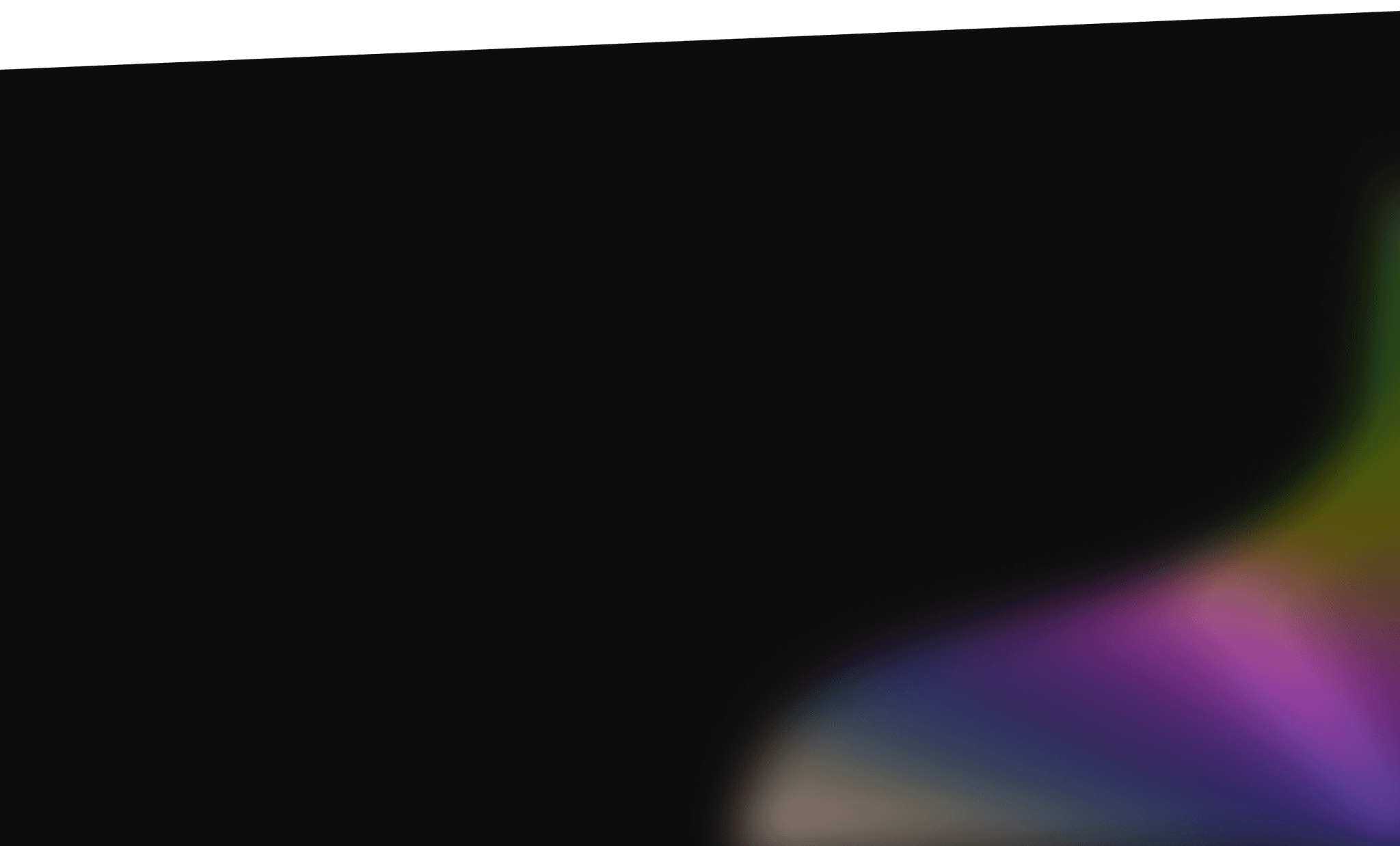PROJECT OVERVIEw
What is Angela?
Angela is a global women's safety app that helps women find the safest routes when navigating new cities alone. By providing peace of mind and reliable safety information, Angela empowers women to confidently explore their surroundings.
My Role
UX/UI Design / User research / Branding
Duration
8 Weeks
Tools
Figma
Challenge
Walking alone in a new city has become a challenge for many women since it’s difficult to get accurate local information on the most dangerous areas or to ask the right person for help when they feel in danger.
Goal
Analyze women behaviours, needs, and pain points to develop a digital solution that helps women feel safer while navigating unfamiliar surroundings.
Result
A high-fidelity prototype of an app designed to empower women. It provides access to updated local information on safe routes, facilitates connections with local users known as 'Angels' who track their safety status and offer assistance when needed. Additionally, users can connect their trusted contacts to share safety updates seamlessly.
DELIVER OVERVIEW
Set your safety place and add trusted contacts
Angela keeps you protected by tracking your safety status and allowing you to explore new places confidently, knowing your trusted contacts are just a tap away.
Discover safe places to go
With Angela, you can easily find and choose destinations based on safety information shared by local women in the city, ensuring peace of mind wherever you go.
Share your route with trusted contacts and walk with local Angels
Never walk alone again! Connect with local users called 'Angels' through Angela and let them offer support and assistance whenever you feel unsafe, creating a network of care and protection around you.
Responsive Marketing Website
I designed a responsive marketing website that effectively communicates the purpose of the app, highlights its core values, and resonates with our target audience.
View Prototype
multi-platform design
my design process
dISCOVER
Research
Assumptions
Interviews
Affinity Map
Jump to step
DEFINE
Persona
Experience Mapping
User Stories
Epics
Task flows
Jump to step
DEVELOP
Sketches
Wireframes
User Testing
Brand Development
UI library
Jump to step
DELIVER
High Fidelity Prototype
Marketing Website
Multi-Platform Design
Jump to step
discover
The Problem space
When walking alone in a new city, it’s difficult to get local information on the most dangerous areas or to ask the right person for help when they feel in danger.
(This means that women have to alter their behaviours, make sure they aren’t walking alone, or avoid going to certain places altogether)
Let's see more data

of women reported feeling unsafe walking alone after dark in the UK in 2022 - According to ONS research

of women aged 18-24 have been sexually harassed - According to UN Women UK investigation

not reporting those situations because of the belief that it would not change anything.
My Assumptions
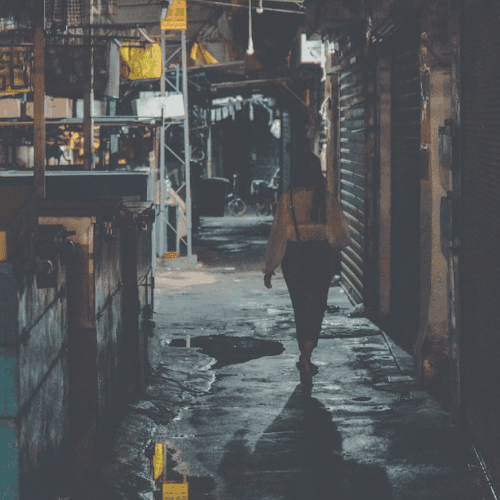
1. Vulnerability
Women are more likely to experience harassment, intimidation, and verbal abuse when walking alone, especially in areas where there are few other people around.
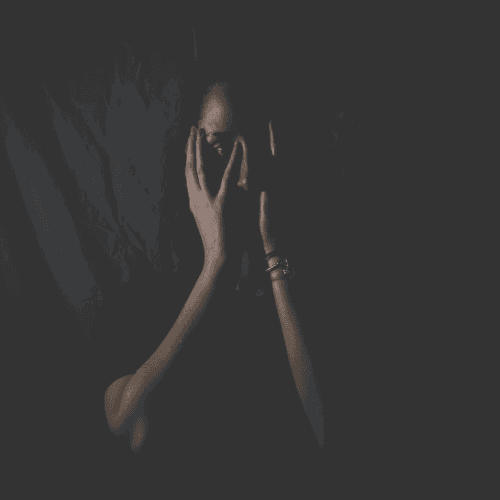
2. Residual Fear
Women who have experienced violence or harassment in the past may be more likely to feel unsafe when walking alone.
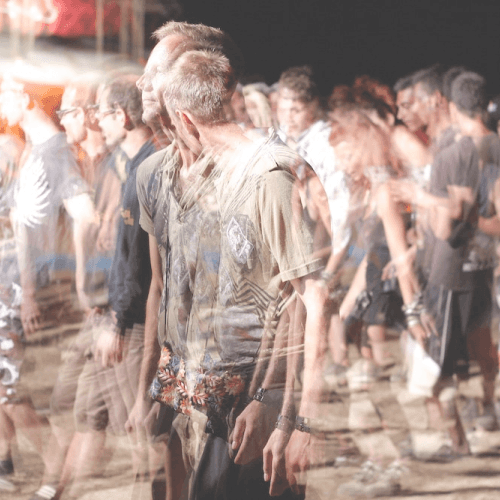
3. Tourist-targeting
New women in tourist areas are vulnerable to attack due to language barriers and fear of appearing naive, hindering reporting and seeking help.
Understanding the User
I’ve conducted interviews with 3 female participants who have lived alone in a new city and now live in UK.
*Names have been excluded from this study to protect the privacy of interviewees

Interviewee 1
A 28-year-old woman who enjoys hanging out with friends, painting, cooking, and traveling. She has lived in the city for six years and finds it very fun. She uses a mix of transportation including the tube, buses, and walking, and often walks a lot since things are close by.

INTERVIEWEE 2
A 30-year-old woman who enjoys playing basketball, socializing with friends, traveling, and reading in her free time. She has lived in the city for four years and has previously lived in several other cities, including Paris and the USA for university. She primarily uses the tube for transportation, preferring it over the bus due to its speed, and only walks when the distance is short. She does not use Uber due to its high cost.

INTERVIEWEE 3
A 36-year-old who recently moved to the city. She loves to spend her free time exploring the city on foot, trying out new restaurants, and traveling. She feels safer in the city than in her hometown of Brazil where she couldn't go out at night. She uses a mix of transportation depending on where she wants to go and the time she has, including a bicycle, bus, train, or boat.
Research findings
I used the Affinity mapping method to find behaviours, motivations, pain points, and group data points by themes. I chose to show the ones I think have more data points and reflect deeper issues and needs experienced by my users.
Reasons why woman feel unsafe being alone
“I hate walking in empty spaces because I’m scared I wouldn’t have help if I need it”
“there’s always fights around my house due to drugs, I’m so afraid walking or being alone”
“someone followed me walking home long time ago, I felt so terrified, I called my friend and asked for help”
“I love living in the central, but I have to be very careful walking at night”
Current measures to protect themselves
“I change my walking routes to avoid certain streets I heard bad news about”
“I always try to make sure to see if the places are safe for women”
“I always share my location with my boyfriend, and let my friend know when I’m home”
“I always have my phone close to me, in my coat pocket in case of emergency”
How they protect others
"I ensure that my friends and I take care of one another when we are drinking together"
“I ask my friends to send me messages when they are home”
“It’s important to check if women are okay while traveling on public transport”
"Ensuring the safety of others can be challenging since it's difficult to predict their actions"
These are the common themes that emerged
#1
Fear and Vulnerability
Women feel vulnerable and at risk when they are alone due to past unpleasant experiences. They are aware of dangerous places and worry about their safety in those situations.
#2
Prevention and Preparedness
Women often carry self-defence items and plan whom to seek help from in potentially dangerous situations. They also take preventative measures to avoid such scenarios.
#3
Watching Out for Each Other
Women prioritize the safety of their loved ones and take proactive measures to watch out for each other and stay safe.
define
How might We help women feel safer walking alone in the city?
Meet Isabella
Through both secondary and primary research, I gained a deep understanding of the target user's goals, values, and needs. Using the insights gathered, I created Isabella to represent the primary user, which helped me to guide my design decisions.
Experience Mapping
I created a visual experience map that showcases Isabella's journey towards her goals. It details her thoughts, actions, and emotions throughout the process. By mapping out Isabella's journey, I gained valuable insights into her needs and motivations. This allowed me to identify key areas for design intervention that informed my subsequent design decisions.
I decided to map the experience of finding a safe route to explore the city because is one of its main pain points of Isabella.
Key opportunities to focus on:
#1
inform
Provide local information about the current events in the areas and show her which ones are considered safe by them
#2
increase trust
Provide reviews from other women experiences walking around areas Isabella wants to visit
#3
build a community
Help Isabella find a women community close to her to ask for help if she’s in danger
User Stories & Epics
From the key opportunities I identified in my experience mapping, I began defining the core functionality and features of my digital product by developing 30 user stories.
These user stories were grouped into epics based on the similarities they shared.
Epics
Finding a safe route to walk alone
Finding local information about safety
Asking for help when feeling in danger
Task Flow
Once I identified the key issue at the core of Isabella's concerns, I refined it into a main objective: to ensure her safety while walking alone in an unfamiliar city. To achieve this goal, I propose a multi-faceted approach that includes finding a secure route for her to explore, allowing her to share her safety status with trusted contacts, and connecting her with other women to walk with.
context
Isabella, a tech industry professional, recently moved to London. She loves exploring new places and had heard about the beautiful Kensington Gardens. One day, she decided to take a long walk in the park. However, being new to the city, Isabella was unsure about the safety of the area. That's when she remembered the safety app she had downloaded. She quickly opened it to find the safest route to the park and any local safety information available. With the app's help, Isabella was able to navigate the city confidently and safely, enjoying her walk in the beautiful gardens.
develop
Sketches
Once I had the task flows built out, I started to sketch my initial designs. This allowed me to try a number of different layout variations.
Wireframes
Once I had settled on my solution sketches, I started developing my digital wireframes in Figma.
User Testing
I conducted usability testing with 10 people in two rounds of my Mid-Fidelity Prototype. The goal was to test the solution with real users to validate and improve the user experience of the App.
Main iterations of first round of testing - Homescreen
Main iterations of second round of testing - Homescreen
Brand Development
Brand name
Through extensive primary and secondary research, I discovered a campaign in the UK called "Ask for Angela" which allows women to seek help from staff in a discreet manner. When a woman uses the code-phrase, a trained staff member provides support and assistance. Considering the popularity of this campaign among women, I decided to name our women's safety app "Angela" to evoke a sense of familiarity and comfort for our users.
Capturing the essence of Angela
To capture the spirit and essence of the brand, I created a Moodboard that showcased the color palette and overall feel I wanted to convey. I chose bold, vibrant colors to represent women's strength and empowerment, and paired them with a dark mode that highlights neon accents to symbolize the light in the dark.
Making Angela Accessible for All
I took a thoughtful approach when selecting the font and colors for the app. Accessibility was a top priority, so I ensured that all text and background color combinations met the minimum WCAG 2.1 AA Level contrast requirements. For the primary typeface, I chose SF Pro, a sans serif font designed specifically for enhanced readability on digital platforms.
UI Library
Takeaways
Working on this project has been a fulfilling experience for me. Being able to combine my passion for technology with a genuine desire to make a positive impact on people's lives has been truly rewarding. I am grateful for the opportunity to work on something that I truly care about, and I am excited to see where this project will take me in the future.
Looking towards the future, I'd love to explore features that are not yet available, such as the emergency alert, saved routes, and community features. I believe there is always room for improvement, and I am excited to explore different ways to make the app even more useful and user-friendly.
